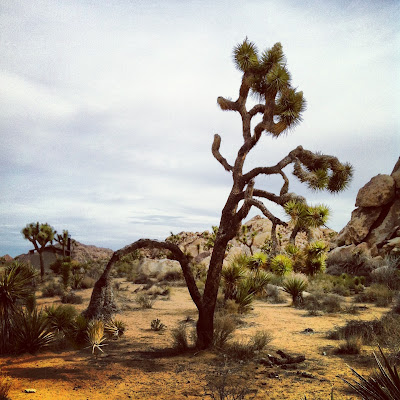Entering the park just outside the town of Joshua Tree, and well before you reach the U.S. Marine Corps base town of Twenty-Nine Palms, at first you navigate an environment that is dominated by huge monzogranite outcrops rising from the surrounding desert floor, liberally dotted with Yucca brevifolia, the eponymous tree. This enchanting plant was originally named by Mormon travelers, who recognized in its shape a gesture worthy of the conquerer of Jericho and of Canaan. Like certain grasses and orchids, the Joshua tree is a very large member of the Agave family.
These wonderful emanations of the high desert twist and writhe and, just now, flower—not so much in stands or sopses but nevertheless in glorious profusion, each producing a performance of strange and ritualistic individualism.
Last
Wednesday I was quite alone, and the effect was one of perfect eeriness. It did not matter that the morning was overcast, for this lent considerable softness and subtlety to the textures of the land, and a definite blueness to certain of the grasses. The
cheerful ranger at the front gate told me that mountain sheep had been spotted
on an escarpment earlier that morning, but I could see nothing as large through my binoculars, only the scratchy junipers, other high-desert conifers, and
these marvelous jumbo Yuccas.
At
length you descend almost imperceptibly towards the great Pinto Basin, which
forms a region of transition between the high Mojave and the hotter and bleaker
but no less fecund Sonoran Desert. These slight shifts in altitude produce an
immediate and colossal transformation in the flora.
The
Joshua trees come to a sudden halt, and make way for smaller succulents and drier, more delicate
grasses and cacti to match the higher temperatures, the pert Cylindropuntia bigelovii or Cholla
cactus, for example, so winning and so absurd, as well as many others, some spiky, some fluffy, others just
now erupting into their rare and almost miraculous moments of flower. The man holding the stop sign where the road works commenced drew my attention to this one, which I would never have seen without careful directions from the road.A day spent wandering through Joshua Tree, preferably more, is enough to impress upon even the most occluded soul the hopeless inadequacy of the English word desert, for instead one senses, as in many parts of Outback Australia, that places such as this are the fons et origo, the birthing places of life itself. How I long to go back!





No comments:
Post a Comment